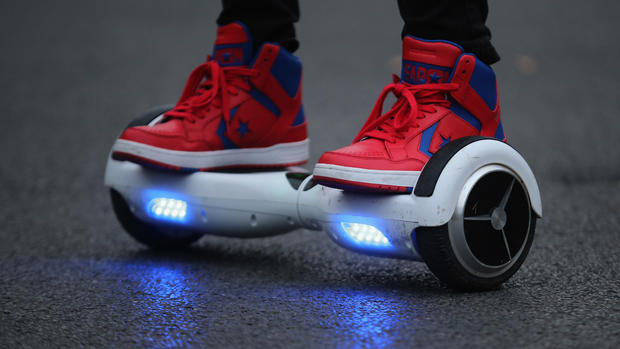No, hoverboards do not have UL approval
It says something about the trajectory of a consumer fad like hoverboards when this is the catchiest sales slogan out there: "Our Skeeterboards are safe and WILL NOT CATCH FIRE!"
Literally and figuratively this year's hottest item under the tree, hoverboards are a must-have item for kids and retailers alike.
Like a Segway without a stick or an electric-powered skateboard that goes sideways, hoverboards are considered cool by the likes of Justin Bieber despite a tendency to spontaneously combust: 12 fires in 10 states so far this year, including one in San Francisco reported Tuesday.
In just a few months, hoverboards have gone from being the hit of New York's January 2015 Toy Fair to a high-priority investigation for the Consumer Product Safety Commission.
Aside from catching fire, safety concerns have led to hoverboard bans on public streets in New York City and the entire U.K., not to mention the floor of next year's Consumer Electronics Show.
"Consumers deserve answers," says CPSC spokeswoman Patty Davis. "We're moving as quickly as we can."
Moving closer to Internet speed, Amazon (AMZN) and other retailers are now demanding -- and touting -- that the hoverboards they sell have Underwriters Laboratories-approved battery chargers, yanking some but keeping many models available during the height of the Christmas shopping season.
Airlines have banned all of them, but at $399 and up, hoverboards are this year's Xbox One in terms of pumping up yearend retail sales, one big-ticket item at a time. Amazon's press office didn't respond to a call and an email seeking comment.
The problem is, UL hasn't approved any hoverboards.
"We have certified many varieties of battery chargers," said John Drengenberg, an electrical engineer and UL's consumer safety director. "That in no way says anything about a hoverboard being approved."
It's a distinction with a big difference, which some in the hoverboard industry would like to gloss over.
Some models carry the UL mark on the box or the hoverboard itself, according to Consumer Reports.
South Bend, Indiana-based Swagway, one of the leading sellers of hoverboards (which apparently are all made from basically the same components in China), has been scrambling to meet Amazon's demand that its chargers carry the UL label.
"Amazon asked that we send certification," said Erica, a customer support representative for Swagway who declined to give her last name or refer questions to a spokesperson. "It has been sent over and is currently in process." Asked whether that applied to the charger or the hoverboard itself, "everything in its entirety has been UL-approved," she said.
By Wednesday afternoon, Swagway's "X1 Hands-Free Smart Board" was listed again for sale on Amazon.
However, even if both a battery and charger are certified to be safe, they aren't necessarily compatible and could create a fire if the battery can't handle the output of the charger, explained UL's Drengenberg. Or they can get overcharged and overheated if left on the charger too long, unless there's some circuitry built into both the charger and the battery to prevent that.
Hoverboard fires could be "due possibly to overcharging because the battery charger and battery pack don't talk to each other," says Drengenberg. UL hasn't tested any hoverboards, therefore, "UL hasn't looked at the compatibility of the battery in any hoverboard," he added.
Drengenberg declined to say whether any hoverboards have been submitted for testing, citing UL's nondisclosure agreements with its clients.
